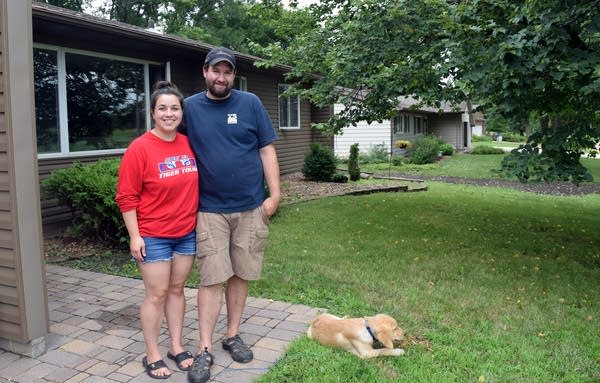Albert Lea smarting over Mayo shrinking hospital services

Go Deeper.
Create an account or log in to save stories.
Like this?
Thanks for liking this story! We have added it to a list of your favorite stories.
Mayo Clinic will stop delivering babies and accepting inpatient and intensive-care admissions at its Albert Lea hospital.
Over the next few years, those services will move a half hour away to the Mayo facility in Austin.
Mayo says it needs to move the services to stop the two hospitals from hemorrhaging money — they've racked up combined losses of $13 million over two years.
But the changes are prompting anger and anxiety in Albert Lea.
Turn Up Your Support
MPR News helps you turn down the noise and build shared understanding. Turn up your support for this public resource and keep trusted journalism accessible to all.
Diane Henry and her husband want a second baby. But she's worried about how far from home she'd be delivering, and whether the obstetrician she knows and likes would be there.
"Not knowing the answer to all these questions is pretty much the most stressful part," she said.
Henry and her husband aren't waiting to wait to find out. They're moving up their plans for a second child.
"I wanted to get a jump on it, just to ensure that we'd have a baby here. So, we're trying now," Henry said.

Retired physician Dr. William Buege practiced in the downtown hospital where Henry wants to give birth. Buege said the location has changed a lot over the decades.
"There were big beautiful homes stretched along here, and those were torn down to build the hospital," he said. "And then Mayo came along, and built this big clinic addition to the front of it."
That was about 20 years ago.
After the new changes are complete, the facility's emergency room and outpatient services will remain along with beefed up behavioral health care.
Still, Buege and others believe Mayo is breaking a promise to keep the place a full-service hospital.
"They didn't follow through on a lot of stuff," he said, "which is one reason why people are so upset about what's happening now."
It's not clear exactly what Mayo promised Albert Lea when it acquired the hospital there in the mid-90s. At the time, Mayo was gobbling up lots of smaller hospitals in the region.
Buege was skeptical of Mayo's expansion to Albert Lea from the start.
"I told them, 'You're going to have a hard time recruiting primary care physicians here,'" Buege recalled. "They said 'Why? We're the Mayo Clinic."'

As it turns out, Buege was right — and staffing is a factor in Mayo's decision to consolidate between Albert Lea and Austin.
Dr. Bobbie Gostout leads the regional hospital network, which is called Mayo Clinic Health System. She said it's hard convincing newly trained doctors to come to small hospitals where they are on call several nights a week.
Improvements in health care are another factor. Patients are spending less time in the hospital. Inpatient revenue is down.
"That's what's become unsustainable: To have two side-by-side hospitals and fully staffed for inpatient care in both of those hospitals," Gostout said.
Gostout said Mayo's plan will allow for more consistent staffing while reducing the number of Albert Lea patients who must travel even farther away to Rochester for care.
Still, Albert Lea's public officials have roundly condemned the changes, including Freeborn county attorney David Walker.
"The consolidation that is occurring here is without a study of the economic impact or the health impact on the people of Albert Lea," he said.
Walker is reviewing whether Mayo violated its own bylaws because the hospital board did not vote to change services. Mayo said a vote wasn't required. But Walker has asked the state attorney general to weigh in.
Operating losses and staffing issues have prompted Mayo to consolidate services at other locations as well.
The forces pressuring Mayo are common in the industry, said health care analyst Allan Baumgarten. Hospitals everywhere are trying to be more efficient and improve quality of care.
Consolidation can help with both, he said, especially when it comes to certain procedures or surgeries.
"If you're doing them in small numbers, chances are the quality is lower," Baumgarten said. "There's something to be said for the notion of 'practice makes perfect.'"
The backdrop to the controversy in Albert Lea is Mayo's ambitious plan to invest billions of dollars in the Rochester campus as part of the Destination Medical Center economic development project.
Gostout rejects complaints from Albert Lea that their hospital is a victim of the project. Gostout said growing pains throughout the system are the cost of ensuring Mayo's long-term survival.
"Growth should not be misinterpreted as easy sailing in one place, and difficulties in another," she said.


